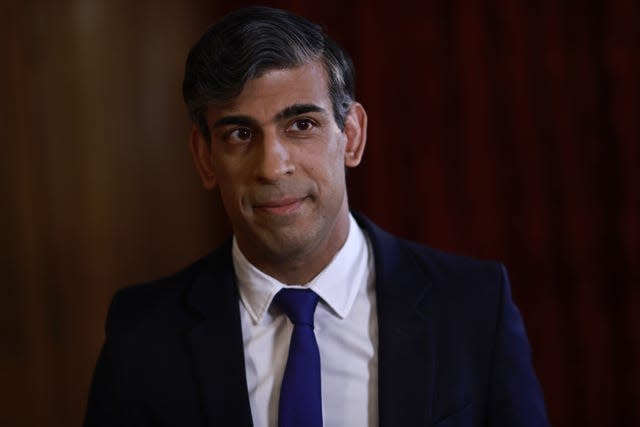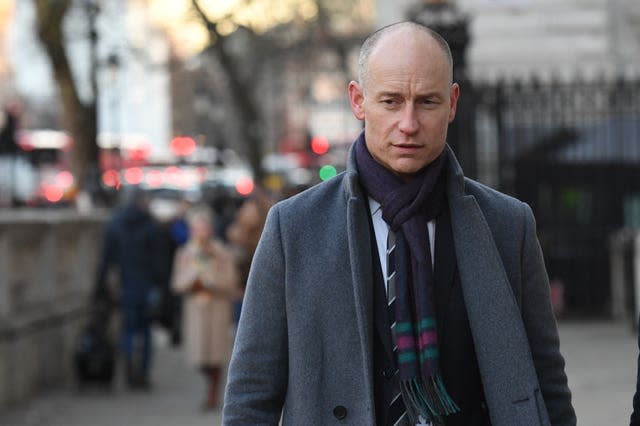Peers urged to relent on Rwanda Bill as MPs reject latest round of changes
Peers have been urged to relent in their deadlock with the Government over the Safety of Rwanda Bill, after MPs again rejected demands for change from the House of Lords.
Home Office minister Michael Tomlinson said allowing the Bill to pass now would “send a clear signal that if you come to the United Kingdom illegally you will not be able to stay”, as parliamentary wrangling over the flagship deportation plan continues.
Downing Street has ruled out making concessions on the legislation, despite reports ministers were considering making tweaks to ensure its passage, including on exemptions for Afghan nationals who assisted British forces.
As MPs rejected four amendments to the Bill, Mr Tomlinson said he had an “optimistic hope” that his contribution on Wednesday might be his “last opportunity” to speak on it.
He added: “We have made it abundantly clear that our priority is to stop the boats, we simply cannot stand by and allow people smugglers to control who enters our country and to see more lives being lost at sea.
“We have an obligation to the public and to those who are being exploited by criminal gangs to stop this vile trade and to protect our borders.
“Letting this Bill pass now will send a clear signal that if you come to the United Kingdom illegally you will not be able to stay.”
It came after No 10 signalled it would not be willing to make changes to the Bill to ensure its speedy passage through Parliament.
“We are not considering concessions,” the Prime Minister’s official spokesman told reporters.

“We believe the Bill as it stands is the right Bill and the quickest way to get flights off the ground.”
All eyes will fall on the House of Lords on Wednesday night, where peers opposed to the Bill will decide whether they continue to insist upon changes voted down in the Commons.
These included an exemption for agents, allies and employees of the UK overseas, such as Afghans who fought alongside the British armed forces, from being removed to Rwanda.
MPs also rejected a requirement that Rwanda cannot be treated as a safe country until an independent monitoring body has verified that protections contained in the treaty are fully implemented and remain in place.
Protections to ensure the Bill has “due regard” for international and key domestic laws, including human rights and modern slavery legislation, were also overturned in the Commons, as was an attempt to restore the jurisdiction of domestic courts in relation to the safety of Rwanda.
Rishi Sunak has made “stopping the boats” a key pledge of his leadership, and sees the Rwanda scheme as a vital deterrent to Channel crossings.

The Prime Minister has previously said he hopes the flights can be begin before the end of spring.
Treasury minister Laura Trott told Sky News there were “lots of definitions of spring” amid concerns the goal might not be met due to the prolonged legislative tussle.
The Bill and a treaty with Rwanda are intended to prevent further legal challenges to the stalled asylum scheme after the Supreme Court ruled the plan was unlawful.
As well as compelling judges to regard the east African country as safe, it would give ministers the power to ignore emergency injunctions.
Shadow Home Office minister Stephen Kinnock said in the Commons the Government is still trying to “scramble high and low” for an airline to be associated with the “unworkable, unaffordable and unlawful” scheme.
The Times reported the Prime Minister could use RAF Voyager aircraft for Rwanda deportation flights after the Home Office failed to find an airline that would charter the flights.
SNP home affairs spokeswoman Alison Thewliss meanwhile described the Bill as a “turd which cannot be polished”.
“With the best will in the world, these amendments are not enough,” she told MPs.
Meanwhile, the Home Office confirmed a new deal with Vietnam to strengthen collaboration on efforts to tackle illegal migration, including through deterrence communication campaigns and intelligence-sharing.
Officials said the agreement will “continue to facilitate the process for the return of those with no right to remain in the UK” and lead to the development of a joint action plan to tackle human trafficking.
Vietnamese nationals made up 5% of small boat arrivals in the UK in 2023, up from 1% in 2022 but the same proportion as in 2021, Home Office figures show.
From 2018 to the end of 2023, there were 3,356 Vietnamese small boat arrivals, putting Vietnam in the top 10 source countries.
Mr Tomlinson, said: “This agreement is an important step with a valued partner to ensure we are working in lockstep to end exploitation by people-smuggling gangs, and to save lives.”


